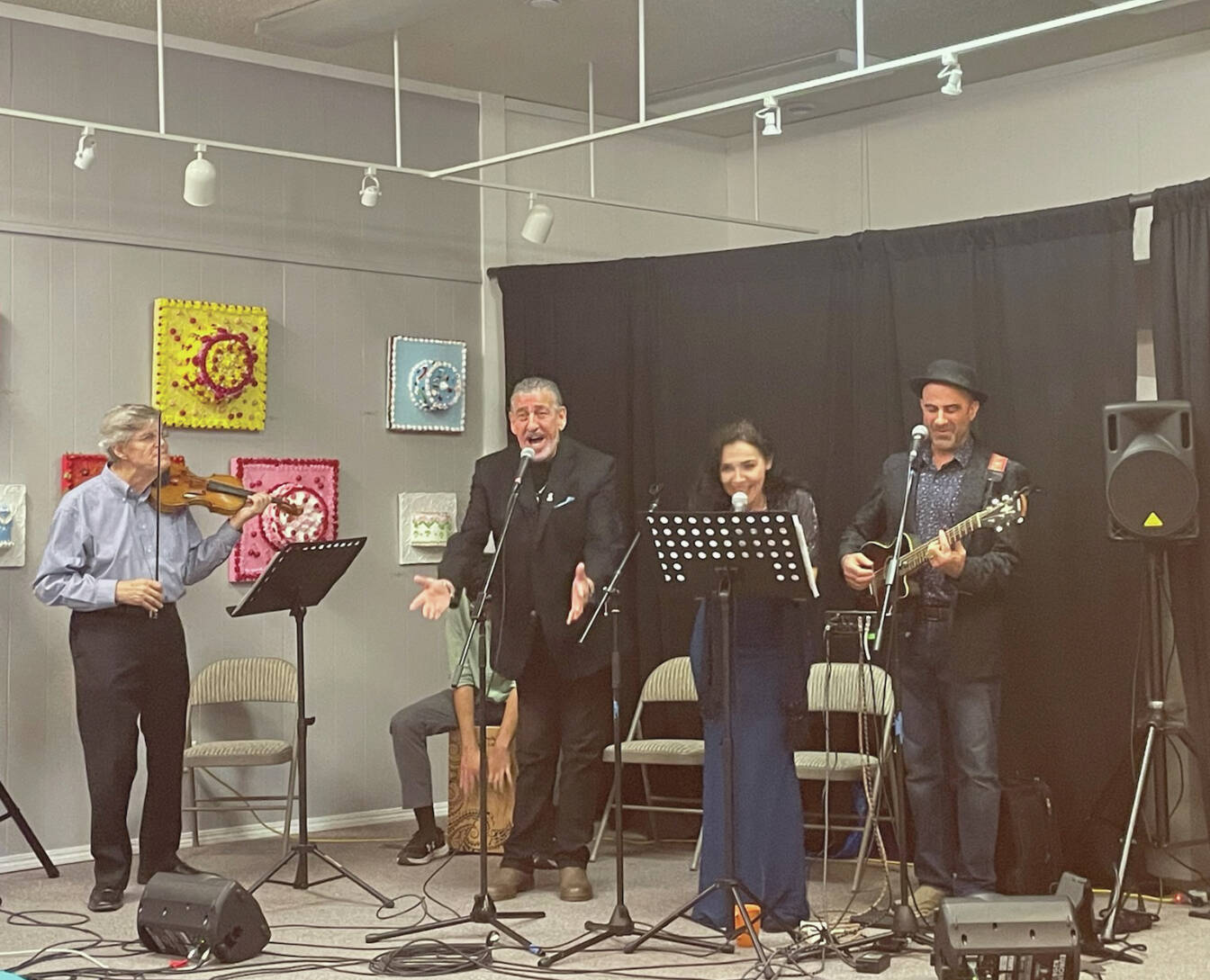The first week of Homer’s sixth annual Alaska World Arts Festival kicked off last weekend with storytelling events and performances by Los Angeles jazz ensemble the Paris Chansons.
At an opening reception held at the Homer Chamber of Commerce last Friday, the Paris Chansons provided the audience with a few of their international jazz ballads ahead of their Saturday night performance at Alice’s.
The seven-member musical group started 12 years ago. Four of the seven official members were present in Homer last week. In attendance was producer and vocalist Julia Kantor, who emigrated from Ukraine in the mid-1970s, when the country was still a part of the Soviet Union. Vocalist Max Cohen, who was born in Morocco and raised in Israel, also performed. Jacob Kantor, Julia’s husband, provided guitar and vocals to the group. The son of a professional jazz musician, he was raised in Moscow and also immigrated to the United States in the 1970s.
Violinist Endre Balogh, also in attendance, has performed as soloist with the Berlin Philharmonic, Rotterdam Philharmonic, Zürich Tonhalle Orchestra, Frankfurt Symphony, and Basel Symphony. In the United States, he has performed with the Los Angeles Philharmonic and the orchestras of Washington, D.C., Seattle, Denver, Dallas and Honolulu.
Joining the group in Homer was special guest drummer, Eli Kantor, son of the other Kantor members.
They performed to a packed audience at Alice’s Saturday and at a much smaller, more intimate gathering at Homer Council on the Arts Sunday. At the smaller Sunday event, Julia Kantor and other group members described more details of their personal background and how they were established as an ensemble.
Julia Kantor described the group’s music as a diverse range of French music with international influences. Since their start, they have gained a significant following, often selling out at shows in Los Angeles. When the group first started, they had no idea the size of the following they would end up with. Their first show had an audience of about 200 people and their second had more than 250.
“We had no idea that we had struck such a cultural chord; some of the audience were French, but many of them were Russians, Romanians, Armenians, Israelis, Moroccans and Lebanese. All these people were singing along with us to these songs. They knew all the words and had such nostalgic looks on their faces,” she said.
After four or five performances, they decided to officially start their ensemble. “It’s really one of the most beautiful things, to see people literally from everywhere, singing together, swaying and dancing united through this music. It’s incredibly powerful, kind of legendary,” she said.
Cohen noted that when the group performs in Los Angeles, interested audience members often have to purchase tickets a month before the show because they typically sell out well in advance of performances.
Julia Kantor named some of the musical work they typically use for performances, noting Joe Dassin, a musician originally from New York who immigrated to France; Dalida, an Egyptian born singer and actress; Enrico Macias, born in Constantine, Algeria; and Charles Aznavour, also of Algerian heritage, who composed more than 1,200 songs in nine languages.
“In the former Soviet Union, American and British music was forbidden. So Beatles were contraband, but French music was welcome, was beloved,” she said.
For audiences with heritage from these places in Europe, “this represents the soundtrack to their lives. This was the song from their first date, the songs that their parents had. This was the song from their wedding. This is the music of celebrations. I mean, this is personal to them, even if they don’t speak the language now,” Julia Kantor said.
Cohen added that the group also performs pieces from more contemporary musicians than those Kantor named. Ninho, for example, is a young French musician with Congolese heritage. Ninho is the stage name for William Nzobazola.
French music is informed with languages from around the world and one of the features unique to this group is their bilingual capabilities. Cohen noted that he speaks four languages and sings in five.
Balogh provided the audience with some additional details about his personal background in violin. He was born in Los Angeles to Hungarian parents and said he started playing violin up until two weeks before he was born because his mother was in the Los Angeles Philharmonic Orchestra. Balogh’s uncle on his mother’s side was a violin crafter and his father was seeking string replacement. His father didn’t speak English and found a shop with a Hungarian owner and that’s how his parents met, he said.
Balogh started playing violin at the age of 3-and-a-half and performed in several concerts at the age of 4 before he became a soloist at the age of 6. In addition to orchestra participation, he was part of a trio that toured internationally for 35 years. One of the things he appreciates about being a member of Paris Chansons is the opportunity for improvisation. “Much of what I do is made up on the spot and I never had the chance to do that before,” he said.
Paris Chansons will perform next at the Catalina Jazz Club in Hollywood on Sept. 20 and have a residency at Herb Alpert’s Vibrato Jazz Club in Los Angeles. Then, they’ll go on tour to Denver, New Jersey, New York, Boston and Florida.
Julia Kantor said the ensemble has not been able to tour in Europe yet, but it’s a goal. They ended their show on Sunday with a typical closing piece, “Those Were the Days,” with lyrics in both English and Russian.
Kantor told the Homer News at the end of the show, “Homer is a really heartwarming place and we hope to come back here.”
To see the remaining schedule of for the festival the program is available at www.alaskaworldarts.org.


